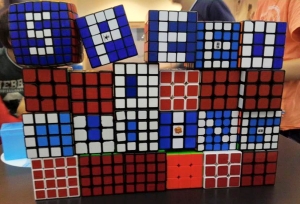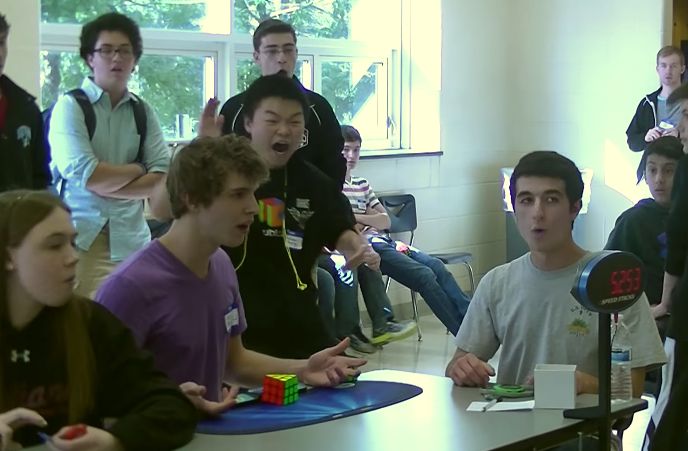Speedcubing
 Ever since its release, the Rubik's Cube has been an entertaining pastime for millions. In fact, it is estimated that over one billion people globally have tried to solve it at some point during their lives. However, there are plenty who go further than struggling to solve the cube for a few minutes before putting it in a box and forgetting it ever existed.
Ever since its release, the Rubik's Cube has been an entertaining pastime for millions. In fact, it is estimated that over one billion people globally have tried to solve it at some point during their lives. However, there are plenty who go further than struggling to solve the cube for a few minutes before putting it in a box and forgetting it ever existed.
Many people prefer to see cubing as a more relaxed hobby; they collect different types, shapes, colours and sizes of puzzle, all variants of the original Rubik's Cube. They are only interested in solving the cube, most coming up with their own methods and algorithms.
However, there are some who take solving the cube further. Simply completing the puzzle had become too easy for them – they needed a new challenge. Hence, speedcubing was born.
Speedcubing was born very recently after the cube itself. Ever since people learnt how to solve the cube they have wanted to solve it faster, and more efficiently. Some devoted their lives to finding the most efficient way of solving any scramble, and tried to discover the maximum number of moves that was required to solve the cube, known as God's number. Others focused on the speed aspect.
Interest grew as the first Rubik's Cube World Championship was held in 1982. 19 competitors, each the fastest solver from their own country, were invited to Hungary to compete. Due to how recent interest was in the cube, the competitors were not allowed to use their own cubes. In fact, a briefcase containing one sealed cube for every competitor was bought to the venue, and each competitor solved the cube three times. The World Record was set by American teenager Minh Thai, at 22.95 seconds. Jessica Fridrich, who placed 10th in the competition with a best solve of 29.11, developed the method used by most speedcubers to date – CFOP.
CFOP is an acronym for Cross, F2L, OLL, PLL, each referring to the four steps of the method. Jessica Fridrich believed that the absolute fastest average that a speedcuber could reach using her method was approximately 13 seconds. Today, nearly 2000 speedcubers worldwide have achieved an average under 13 seconds.
Speedcubing was forgotten after 1982, for over two decades. Nobody held another competition until 2003. Unfortunately, only 4 of the original 19 competitors from 1982 ever competed in another competition. Two of them created methods still in use today (Jessica Fridrich and Lars Petrus)
Speedcubing today is very different from what is was back in 1982. Competitors are allowed to use their own puzzles. They complete five solves and an average is taken of the three remaining after the best and worst are dropped. Also, there are now 18 total events, each with different and unique challenges or restrictions.
The current World Record is set by Yusheng Du (China), who solved the cube in 3.47 seconds.

Collin Burns breaking the World record in May 2015 with 5:25 seconds.
What does it take to become a speedcuber?
Starting speedsolving is relatively easy. Unlike many other hobbies, you don't need a lot of money to purchase expensive equipment. Anyone can pick up a cube that maybe they tucked inside a box several years before, or purchase one online for a few dollars. In fact, the most expensive Rubik's speedcube used by many speedsolvers is just $26. Most of the highest-end speedcube cost only $15. Surprisingly, the type of 3x3 used to set the 5.25 World Record is available for just $9. (All prices taken from The Cubicle)
Although the monetary demands are fairly low, time and patience are key. First solving the cube can take weeks, even using a tutorial, or you can use the online Rubik's Cube solver program to calculate the solution for you. If you want an extra challenge, you could try to learn to solve the cube without a tutorial.
The common belief is that speedcubers have incredible memory capacity and superior intelligence. However, these are not true. Learning algorithms, which can greatly help to increase your speed when solving the cube, is all about muscle memory. If you asked a speedcuber to perform a T permutation (an algorithm that swaps two adjacent corners and the edge between them with the opposite edge in a “T” shape), they could probably execute it pretty fast. But if you asked them to state the individual moves using the standard cube notation, they would have to think about it and say the moves slowly. No speedcuber knows every algorithm by the notation alone. They train to recognise the case and then let their hands do the work. In fact, many speedcubers probably couldn't execute all the algorithms they know slowly; they have trained their hands to perform it quickly, so doing it slowly seems unnatural.
Getting involved in speedcubing
The English-Speaking Speedcubing Community mostly interact with other cubers on the forum website www.speedsolving.com. Unlike most other online communities which are riddled with rules abusers, trolls and people not even interested in the topic at all, Speedsolving is one of the friendliest and active communities you will ever find. If you need help, there is always someone willing to offer it. Nobody is discriminated due to their speed. There are cubers who visit the forums regularly that take several minutes to solve the cube, and there are speedsolvers who can do it in under 10 seconds.
Competitions are a fun and exciting way to meet other speedcubers from your country. Organised by appointed Delegates of the World Cube Association, competitions are normally held for either 1 or 2 (or even 3 for the largest competitions) days on weekends. Don't be discouraged by the word competition; as with the forums, everybody is welcome regardless of speed, and nobody will discriminate you because of your speed. In fact, if you make friends and ask around, people may even help you get faster. The first competition is always the most worrying – it'll probably be the first time you've ever been in a room with several other people solving the cube. It is probably the only place in the World where being able to solve the cube isn't a massive feat. Nevertheless, the atmosphere is incredible, and it is something everybody should experience.
Keep reeding about Rubik's Cube Competitions...